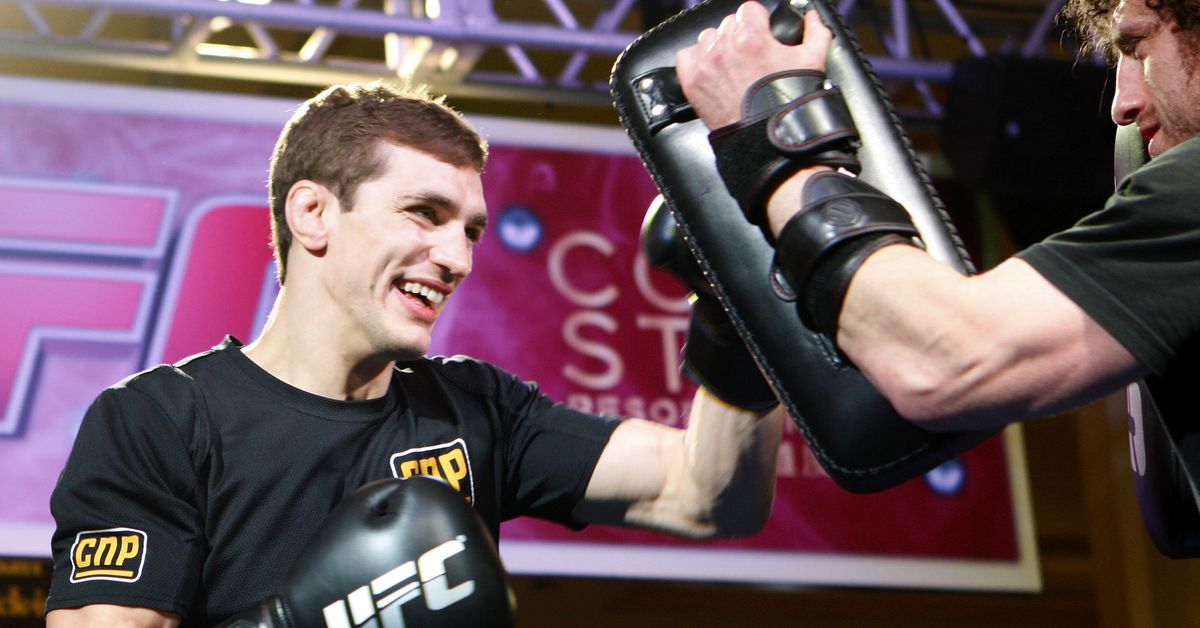John Hathaway is about two weeks away from returning to the cage after an eight-year layoff from the sport due to a battle with ulcerative colitis.
Now 35, Hathaway is set to fight a TBA opponent on Oct. 15 at Oktagon MMA 36 in Frankfurt. Although he has signed a 4-fight contract with European Promotion, Hathaway said that if he is successful, he may be UFC-bound.
Hathaway never considered hanging up his gloves even as he struggled to overcome the often debilitating symptoms of the disease. His love for combat sports never left, and his desire to compete brought him back.
“I didn’t finish my career in the way that I wanted to finish it,” Hathaway said on The MMA Hour. It felt a bit like I was losing it, but I am just grateful that I have managed to turn this around to compete again .”
.
Ulcerative colitis is a type of Crohn’s disease that causes inflammation and ulcers within the digestive tract. This can lead to weight loss, difficult toileting, and pain. The disease develops over time and can lead to life-threatening symptoms such as bleeding.
Hathaway claimed that the illness developed after his first setback in his professional career, which was a loss to Mike Pyle in 2010.. He could still train in some camps, but he had to stop training at other camps because he developed additional symptoms.
“It’s just kind of a general discomfort,” Hathaway said. It’s not quite as severe as being cut, shot, or stabbed, but it is a general, low-level, discomfort. When it flares up even worse, it gets even more uncomfortable, just very hard to train to a good level really because you’re constantly fatigued on it.”
After turning down three to four fights Hathaway decided he could not continue his career as he was battling the illness. He didn’t officially retire, but the promotion gave him time to work out his health issues. The UFC’s anti-doping partner, U.S. Anti-Doping Agency, continued to test him throughout his layoff, a fact he wasn’t particularly bothered by.
“They still tested me at least three, four times a year for the last eight years,” he said. “All the guys that came and tested me were super nice. So I don’t mind. I guess the only annoying thing was large parts of it I was on different medications before I had the surgery. Random, bizarre immune suppression medication was what I had. After the first couple, I made sure it had it written down on my phone, rather than being like, ‘Oh, I’m on these medications,’ and trying to find what ones I’m actually on, because they’d always catch me at the gym teaching, or sometimes first thing in the morning.
“The good thing about it, I guess, in hindsight, in back to doing this is that I’ve been clean for the last eight years or seven years, so I don’t have to have any set-in period where they’re like, ‘Oh, we need to test you a lot for the next six months to make sure you’re not taking anything.'”
After three surgeries, including one to remove a five-pound piece of his large bowel and another to install a stoma bag for waste, Hathaway said he’s technically cured. Initial concerns were raised by doctors about what might happen to Hathaway if he did a body shot at the gym. Eventually, though, he was able to return to normal functioning. He doesn’t have the waste bag anymore and can train as normal. However, his diet choices are more detrimental than ever.
It was not an easy process to get back to health. Hathaway was at his lowest point after the first operation. He had to be admitted back in hospital. It was near the Christmas holiday, and the private hospital he’d gone to for the procedure was half-empty. Walking around the empty hallways, he felt like the main character in 28 Days Later, carting around an IV bag as he walked to stimulate his bowel.
Why did it take so long for Hathaway to get to this point? A lot of it has to do with where he left off with the UFC. A one-year layoff is a significant absence. Hathaway had been gone more than a half-decade. Many of the opponents he fought were retired or no longer in the UFC. The idea that he could simply come back and pick up where he left off didn’t seem realistic to his longtime promoter.
” They didn’t know what to do about me,” Hathaway stated. They didn’t want me to be thrown back in, but they wanted me to have the ability to do it again. … They kind of wanted me to go to a tuneup battle somewhere. It was a while before I found an organization willing to accept me. It took a while to find an organization that would accept me .”
.
If everything goes well on October. 15, Hathaway stated that he will begin negotiating with UFC regarding a return. Until then, he’s going to enjoy his first trip back to the cage. He never expected to be gone this long, but he’s confident that he’s close to where he was when he left.


